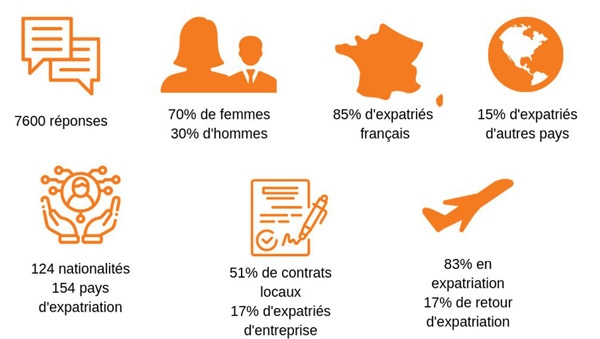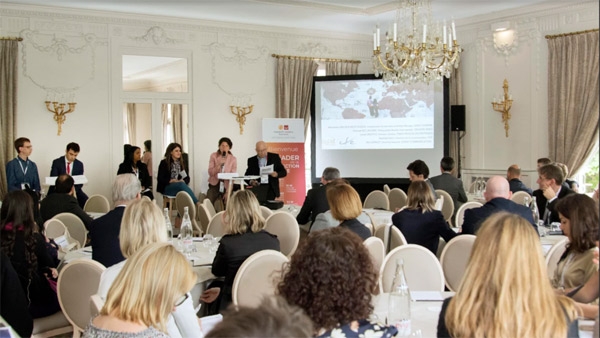2019 Barometer: major trends
You are a company and want to know more about the barometer board?
Major trends
In 2015, with the support of the CFE et a group of partners (Ile de France Region, Banque Transatlantique, Agence Française de Développement, Saint-Gobain, Adéo and Sage International), Expat Communication created the « Expat Lab » dedicated to monitoring major trends in international mobility. In particular, it includes a major survey analyzing international mobility trends every two years.
The Caisse des Français de l’Étranger et Expat Communication have publish in June the first results of the third edition of this survey. Over 7,600 completed surveys and 24,000 testimonials were collected, more than double the amount compared to the previous edition. This detailed analysis of the impact of international mobility on the lives and careers of expats helps dissipate many stereotypes. Beyond the aspects related to expatriation motivations, compensation and the ranking of the most appealing countries, what strikes the most this year in the feedback is the difficulty in balancing careers, personal relationships and family life as an expat, but also when returning home.

So, when asked what are the priorities in an expat experience? Personal relationships and family life are among the top three most cited priorities for 64% of respondents, just behind professional careers (69%) and discovering a new country (58%).
How can one reconcile careers, personal relationships and expatriation? This is the big question of the survey.
We become expats to move our careers forward
64% of expats consider expatriation to be positive on their careers and 57% have improved their standard of living. After returning home, 58% still think that the impact on their careers has been positive.
For personal development first
Expatriation is acclaimed by 83% of expats; the main benefits being personal development, cited in the 3 main benefits by 62% of those concerned, tied with the discovery of a new country/culture. Professional development follows for 39% of respondents.
The price to pay: homesickness and loneliness.
The three main difficulties of being an expat, widely shared in the comments, are homesickness with respect to friends and family (42%), the language barrier (28%) and loneliness (24%).
Social security: an overlooked issue
The survey shows that only 32% of expats make inquiries about social security when leaving France. Yet, selecting adequate social protection prior to your move is key to put your mind at ease and to be covered under any circumstance because the French system is not transposable. Social protection encompasses health insurance, life and disability insurance and retirement, three crucial issues when living far from France and its health system.
Gathering reliable information before leaving France is important but also when returning home. According to the survey, when returning home, 44% of expats encounter difficulties with their administrative formalities. It is essential to anticipate these difficulties by choosing a health insurance plan linked to the French Social Security and thus maintain your rights throughout your expatriation.
An important inequality between spouses
The survey confirms the results from previous editions: when a company expatriates a couple, 90% of the time, it is the man who is transferred and the woman follows. Only 40% of spouses of corporate expats work. A reinvention that only 60% consider as an opportunity.
45% of expats think that expatriation has brought their couple closer together. In contrast, 8% of the couples interviewed after returning home are separated. And divorce while living as expats can quickly become complicated, even more so in case of financial dependence.
And what about the kids?
Parents are satisfied with the impact expat life has on their children. When leaving and when returning, 62% consider the expat experience as positive for them. 98% of parents think that their children have settled in well overseas.
Homesickness...
Even if children adapt quickly, leaving their friends is a difficult experience for 45% of them and 55% miss their extended families. But the benefits of being an expat kid are generally greater: for 82% of the parents, these are the discovery of a new culture; for 81%, learning a new language and above all, parents are pleased that their children are more open minded (87%).
Schooling
60% of the French kids were enrolled in the French system abroad Read our infographyhere. (A French exception as only 12% of children of other nationalities living abroad do their schooling in the system of their home country). An essential advantage for French children who maintain continuity, and for parents who can easily follow the schooling of their children. 70% of parents also continued to raise their children in the native culture of their home country their expat experience. A judicious choice no doubt as uprooting is generally cited in third position as one of the major difficulties encountered during expatriation for 1 out of 4 children.
Other results from the study can be requested from: expatlab@expatcommunication.com
The survey looks at the impact of expatriation in a global way. Thus it addresses many topics and concerns of leaving and returning expats, in their professional, personal, social and family lives.
Some examples below:
- Integration in the host country
- Children in expatriation
- The preferred countries of expatriates according to different criteria
- Retiring expatriation
- The situation of the “trailing” spouse
- Reasons & motivations for expatriation
- Gender equality in expatriation
- Job searching expatriation
- Overall, the challenges and benefits of expatriation
- The impact of expatriation on the life of the couple
- Social life
- Languages
- Expatriate students
- The company’s aid
- Children’s education system
- The loyalty of the expatriate to his company
- Social protection & personal finances
- Returning home : the challenges
- Women & expatriation
- Keys to a successful expatriation

Methodology
The survey was conducted using an online questionnaire from February 15th to April 30th, 2019 targeting more than 300,000 people over the age of 18, of any nationality, having lived or living as expats for more than a year. Under the auspices of Professor Olivier Wurtz, PhD, research professor at Arts et Métiers, ESCP in France and at the University of Vaasa in Finland. He coordinates research programs on expatriation with American and European universities. The results of this survey will be incorporated into these research efforts.
About Expat Communication
Since 2001, Expat Communication is the expert in human accompaniment in expatriation. Its job: to identify and transmit to expatriates the keys to successful mobility. To this end, its Expat Lab gathers, analyzes and broadcasts data on expatriation trends and regularly publishes the results of its surveys and research projects as well as reference books on expatriation. The Network division publishes two websites: femmexpat.com, the women’s expatriation magazine and expatvalue.com, the expatriation career website. The coaching and training division prepares and accompanies expatriates and their families in their mobility on behalf of large companies thanks to the coaches gathered in its Coach Academy.
About the CFE
The « Caisse des Français de l’Etranger (CFE) » is a social security fund specially created in 1978 for French expatriates. It provides social security benefits of the same level as in France, regardless of the situation during the expatriation or country of residence, and without exclusion related to the nature of the pathology or circumstances (natural disaster, acts of war, terrorist attacks…). The CFE ensures continuity with the French Social Security at the beginning and after returning from your expatriation and ensures the same level of reimbursement as in France for health expenses abroad or during temporary stays in France. In 2018, nearly 200,000 individuals are covered by the CFE worldwide. www.cfe.fr
Take the current survey
The questionnaires are available in French or English. This link is accessible from your computer, tablet or phone.
Duration of the questionnaire: about 5 min
Your answers are treated confidentially, and if you wish to receive the results directly and answer our future surveys, you will be redirected at the end of the questionnaire to a second link to guarantee the anonymity of your answers to our survey.
Your participation is essential, thank you in advance for taking time to respond.

Sabine Garnier-Posez
After studies and a professional career in economics and accounting, Sabine expatriated with her family, first to Morocco, Brazil, Germany and is now in Dubai, United Arab Emirates. Sabine joined Expat Communication as Project Manager of the Expatriation Barometer
Be part of the panel
You would like to receive the results of our survey, participate in our next surveys on expatriation or simply follow us on social networks?



